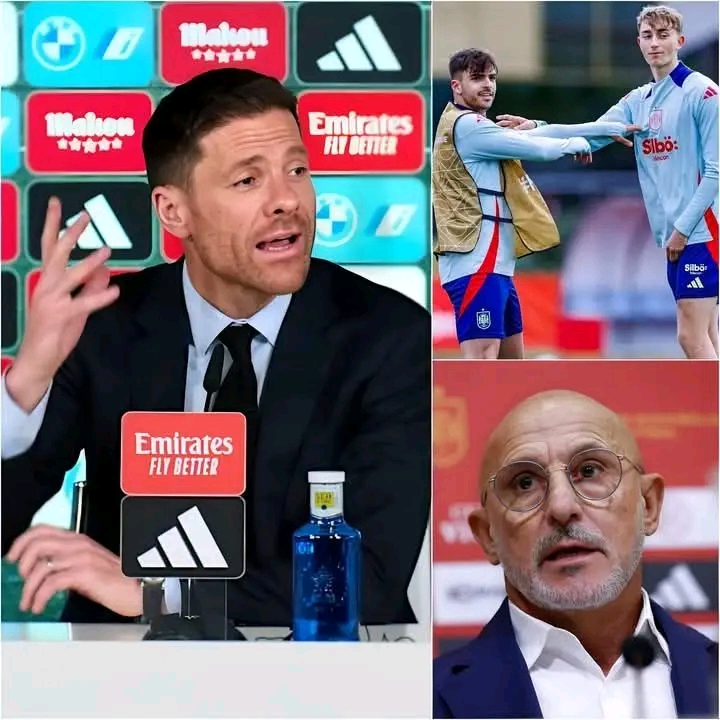Sport
Tensions Rise Ahead of Nations League 2025: Xabi Alonso vs. Luis de la Fuente

A brewing conflict between Xabi Alonso and Luis de la Fuente has captured the attention of Spanish football fans ahead of the 2025 Nations League. Alonso, the former Real Madrid midfielder and current Bayer Leverkusen manager,
reportedly advised Madrid players to avoid mingling with Barcelona teammates during national team preparations. His comments have ignited controversy, given the historic rivalry between the two clubs. De la Fuente, Spain’s head coach, swiftly responded by dismissing Alonso’s stance.
He stressed that national team unity must always come before club rivalries, emphasizing that players must set aside differences when representing their country. His remarks were seen as a direct rebuttal to Alonso’s divisive suggestion. The disagreement has sparked debate among fans and analysts.
Some support Alonso’s protective approach, arguing that minimizing tensions between rival players could benefit team dynamics. Others, however, believe de la Fuente’s emphasis on cohesion is crucial for Spain’s success in international competitions. Alonso’s ties to Real Madrid add another layer to the dispute.
As a club legend, his influence over Madrid’s players is significant, and his comments have been interpreted as an attempt to shield them from potential conflicts. However, critics argue that such an approach undermines the spirit of the national team. De la Fuente, on the other hand, has consistently advocated for a united squad.
His management style prioritizes teamwork, and he has previously navigated club rivalries within the national setup. His firm response to Alonso’s remarks reinforces his commitment to this philosophy. The clash highlights the broader challenge of managing players from rival clubs in international football. While club loyalties run deep,
national team success often depends on overcoming these divisions. Spain, with its history of integrating Barcelona and Madrid stars, is no stranger to this balancing act. Historical context adds weight to the debate.
Past Spain squads, particularly during their golden era (2008-2012), thrived despite fierce club rivalries. Players like Xavi, Iniesta, Casillas, and Ramos put aside differences to achieve international glory—a precedent de la Fuente seems keen to follow.
Alonso’s comments may also reflect his inexperience in international management. Unlike de la Fuente, who has worked extensively with Spain’s youth teams, Alonso’s coaching career has been club-focused. His approach, while understandable from a club perspective, clashes with the demands of international football.
The fallout from this dispute could impact Spain’s Nations League campaign. If tensions persist, team morale and performance may suffer. De la Fuente’s ability to manage these dynamics will be crucial in ensuring a harmonious squad ahead of the tournament. Ultimately,
this incident underscores the delicate balance between club and country in modern football. While rivalries add passion to the game, national teams require unity to succeed. How Spain navigates this challenge could define their Nations League prospects.
As the tournament approaches, all eyes will be on Alonso, de la Fuente, and the Spanish squad to see whether club divisions fade in pursuit of international glory.

 Sport11 months ago
Sport11 months ago“I’m not trying to criticize Ancelotti, but I’m not happy with him for benching that player”: Bellingham Expresses Frustration Over Ancelotti’s Tactical Decision

 Sport11 months ago
Sport11 months agoBREAKING: Manchester City vs Liverpool Clash Cancelled! Title Race Takes a Twist

 Sport11 months ago
Sport11 months agoArsenal Poised for January Swoop on €70 Million Star Dusan Vlahovic

 Sport11 months ago
Sport11 months agoWHAT ON GOD’S GREEN EARTH DID WE JUST SEE?!

 Sport11 months ago
Sport11 months agoReal Madrid: Carlo Ancelotti’s Surprising Revelations About an Unexpected Quality of Vinicius

 Sport11 months ago
Sport11 months agoBREAKING: Arsenal’s Champions League Quarterfinal Opponent Revealed After Monaco’s Dramatic Win – Tough Challenges Await Arteta’s Men

 Sport11 months ago
Sport11 months agoChelsea Players Facing Suspension as Yellow Cards Mount

 Sport11 months ago
Sport11 months agoKey Arsenal Player Set for Return as Gunners Face Struggling Everton
















